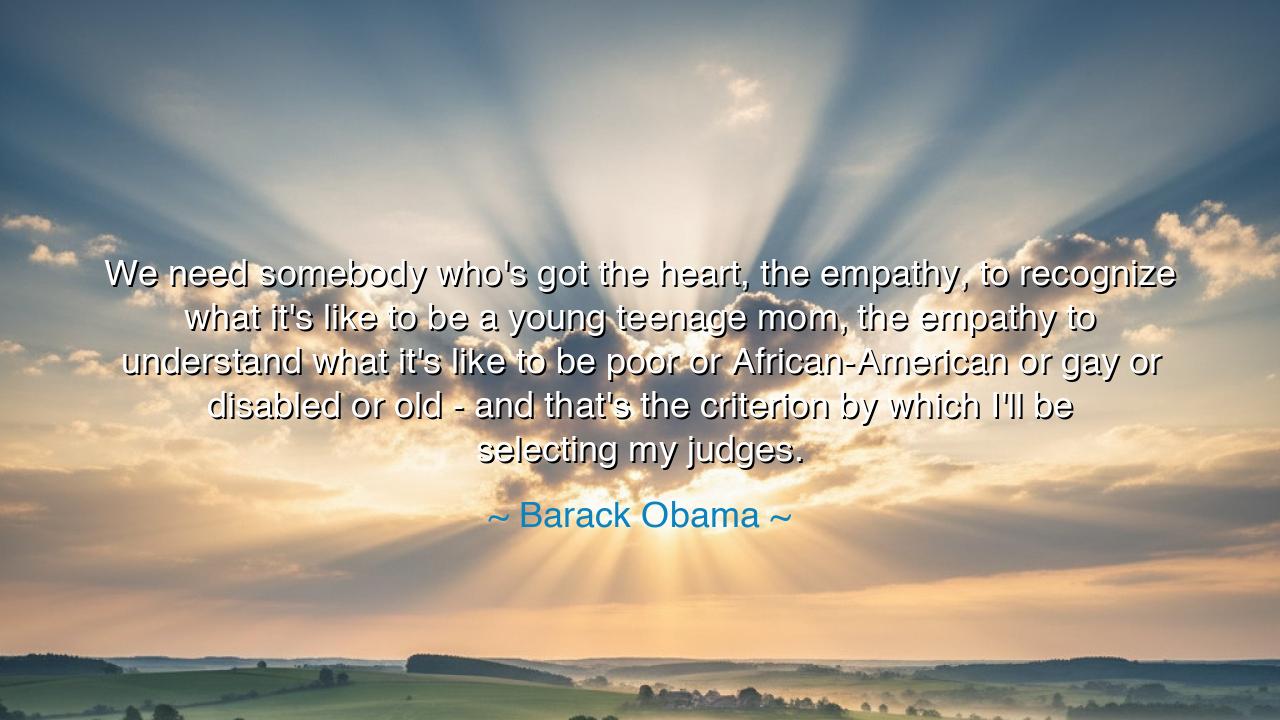
We need somebody who's got the heart, the empathy, to recognize
We need somebody who's got the heart, the empathy, to recognize what it's like to be a young teenage mom, the empathy to understand what it's like to be poor or African-American or gay or disabled or old - and that's the criterion by which I'll be selecting my judges.






When Barack Obama declared, “We need somebody who's got the heart, the empathy, to recognize what it's like to be a young teenage mom, the empathy to understand what it's like to be poor or African-American or gay or disabled or old — and that's the criterion by which I'll be selecting my judges,” he was not merely speaking of the law — he was speaking of the soul of justice itself. In these words lies a vision of leadership rooted not in intellect alone, but in compassion, in the ability to feel the pulse of another’s life. Obama’s words remind us that wisdom without empathy is blind, and power without compassion is tyranny. He spoke as a leader shaped by struggle, as one who understood that the measure of justice is not how it treats the strong, but how it uplifts the vulnerable.
In the days of the ancients, the rulers who endured were those who understood this sacred balance. The great King Solomon, when offered any gift by the Divine, did not ask for riches or victory, but for a listening heart — a heart that could discern between good and evil, between truth and falsehood, between justice and cruelty. It was this wisdom of compassion that became the cornerstone of his reign. So too, when Obama spoke of empathy as a criterion for judgment, he was invoking the same timeless principle: that true justice is not a sword, but a scale — one that must be held by steady hands and guided by a tender conscience.
The origin of Obama’s quote can be traced to his reflections on the U.S. judiciary, given during his presidency, when he spoke of the kind of judges he sought to appoint — men and women capable of understanding the full spectrum of the human experience. Yet his message transcends its political moment. It speaks to the universal truth that empathy is the foundation of moral governance. A judge who cannot imagine the pain of the poor cannot deliver fairness; a leader who cannot feel the fear of the marginalized cannot govern with justice. To see the world through another’s eyes — this, Obama teaches, is the highest form of strength.
History is filled with the contrast between those who ruled with empathy and those who ruled without it. The Roman Emperor Marcus Aurelius, philosopher and stoic, wrote in his meditations that the purpose of power is service, not dominance. He carried the sorrows of his people as his own burden, and in doing so, preserved harmony in an empire teetering toward chaos. In contrast, rulers who sought control without compassion — like Nero or Caligula — became architects of ruin, consumed by their own vanity. Obama’s words, though spoken in the modern tongue, echo this ancient wisdom: that leadership without empathy becomes cruelty disguised as order.
But the beauty of Obama’s message lies not only in its political wisdom — it is deeply human. He speaks of the teenage mother, the gay youth, the disabled elder, the poor laborer — those who walk the edges of society, often unseen, unheard, and unvalued. By naming them, he restores their dignity. His words call forth a truth we too often forget: that the strength of a nation lies not in its wealth, but in its compassion, not in how high it can build, but in how low it will reach to lift the fallen. Empathy, then, is not softness — it is courage. It is the act of opening one’s heart even when the world teaches you to close it.
In every age, there are those who rise because they can feel what others feel. Consider Abraham Lincoln, whose sorrow for the suffering of enslaved people became the fuel for liberation. He once said, “I have always found that mercy bears richer fruits than strict justice.” This is the same spirit that moved through Obama’s words. To lead with empathy is to lead with vision — to see not only what is, but what could be if kindness were given the force of law. It is to believe that justice and mercy are not opposites, but two hands of the same heart.
And so, my child of the future, take this lesson into your own life: empathy is not a trait for the powerful alone — it is the duty of all who live among others. When you judge, judge with understanding; when you speak, speak with compassion; when you act, act with awareness of how your choices touch the lives around you. The law of humanity is higher than any court’s decree — it is written in the conscience, and it demands that we recognize ourselves in one another.
For as Barack Obama taught, to build a just world requires more than intellect — it requires the heart to imagine another’s pain, and the courage to relieve it. Only then can the scales of justice truly balance. Only then can civilization call itself enlightened. Let us, therefore, pass down this wisdom as our ancestors did: that empathy is the highest form of strength, and that the world is healed not by judgment, but by understanding.






AAdministratorAdministrator
Welcome, honored guests. Please leave a comment, we will respond soon